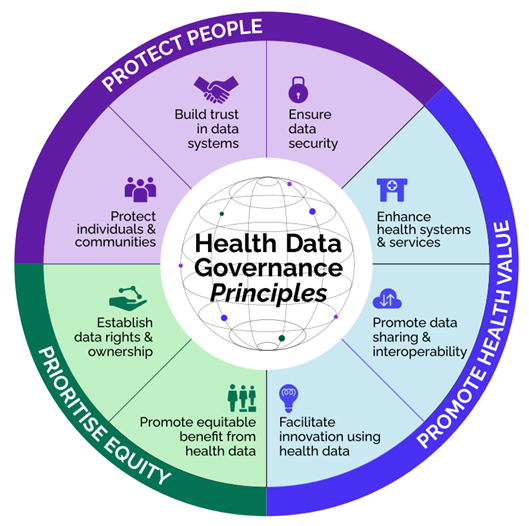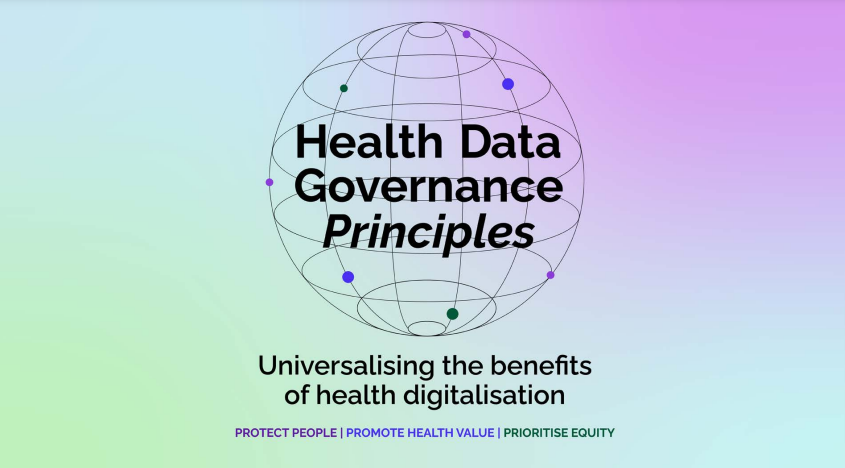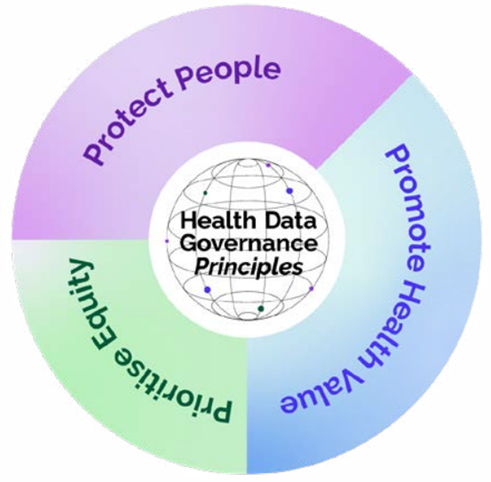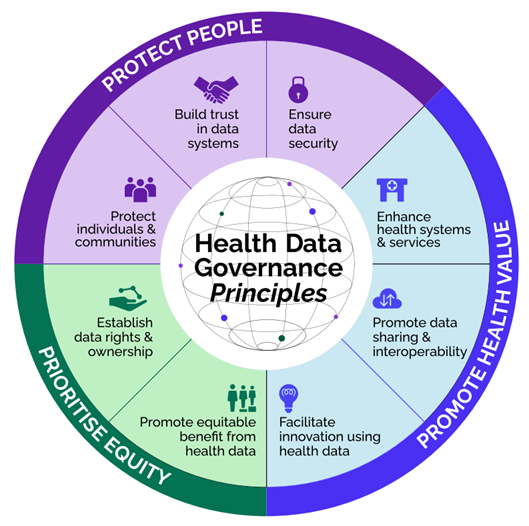Universalising the benefits of health digitalization
protect people | promote health value | prioritise equity
Transform Health
Anna Volbrecht (PATH) and
Akarsh Venkatasubramanian (Transform Health).
2022
Executive Summary by:
Joaquim Cardoso MSc
Health Transformation Institute
Data Health Unit
July 4, 2022
Why do we need principles on data health governance?
Digitisation has allowed an exponential increase in the production and use of health data and data for health.
- This increased availability of timely data offers huge benefits for practitioners, policymakers, and individuals seeking to improve personal and public health.
- At the same time, weak governance of health data risks exacerbating health inequities, perpetuating bias and discrimination towards marginalised communities, and undermining individual health and human rights.
The need for stronger health data governance has never been greater.
- A set of globally accepted principles for health data governance that are regionally and sectorally representative is urgently required to redress the uneven distribution of benefits and harms that we currently see arising from the collection, analysis and use of health data.
- Consensus on high-level principles is an important step towards the creation of a global health data governance framework that could support the use of digital technologies and data for the public good.
About the principles
Data-driven approaches are increasingly the norm or aspiration in the operation of health systems.
- The collection, processing, storage, analysis, use, sharing and disposal of health data has grown in complexity.
- This exponential increase in data use necessitates robust and equitable governance of health data.
- Countries and regions around the world are instituting health data governance policies and legislation.
However, there is not yet a comprehensive, global set of principles to guide the governance of health data across public health systems and policies.
- The Health Data Governance Principles respond to that need.
The Principles are intended as a resource for, and have applicability to, a range of stakeholders involved in the collection and use of health data, including governments, the private sector, international organisations, civil society, among others.
We encourage all stakeholders to endorse the Principles.
We want to see the Principles adopted by governments, technology companies, and other institutions responsible for collecting and managing health data.
The 8 principles:
- The Health Data Governance Principles are designed to complement and reinforce one another.
- The Principles are clustered around three overarching objectives:
– protect people,
– promote health value, and
– prioritise equity


INTRODUCTION
The Health Data Governance Principles, presented here, bring a human rights and equity lens to the use of data within and across health systems.
They are oriented towards supporting sustainable and resilient public health systems that can deliver Universal Health Coverage (UHC).
At the United Nations High-Level Meeting on Universal Health Coverage in 2019, world leaders reaffirmed their Sustainable Development Goal commitment to extend UHC to all people by 2030.
Digital health and data-driven health systems can help strengthen the delivery, quality and equity of health services, providing an important opportunity to accelerate progress towards UHC.
UHC — and the values of equity and human rights that underpin it — must be at the core in the design and development of data-driven health systems.
Data-driven approaches are increasingly either the norm or the aspiration in the operation of health systems and provision of health services.
The collection, processing, storage, analysis, use, sharing and disposal of health data has grown in complexity.
The COVID-19 pandemic has accelerated the use of data.
This exponential increase in data use necessitates robust and equitable governance of health data.
Countries and regions around the world are instituting health data governance policies and legislation.
However, there is not yet a comprehensive, global set of principles to guide the governance of health data across public health systems and policies. The Health Data Governance Principles respond to that need.
However, there is not yet a comprehensive, global set of principles to guide the governance of health data across public health systems and policies. The Health Data Governance Principles respond to that need
The Principles are meant to inform and strengthen governance models, instruments, treaties, regulations and standards across countries and regions around a shared vision of equitable health data governance.
They are a tool to support the use of digital technologies and data for the health and well-being of all. They are a critical step towards a global framework for health data governance.
The Health Data Governance Principles recognise and build on existing norms, principles, treaties, conventions, and guidelines, including:
- the World Health Organization (WHO)’s data principles[1] (a framework for data governance for WHO) and their guidance on the ethics and governance of artificial intelligence for health[2];
- the Principles for Digital Development[3] and Digital Investment Principles[4] stewarded by the Digital Impact Alliance;
- the Organisation for Economic Cooperation and Development (OECD)’s Recommendation on Health Data Governance[5] and their Principles on Artificial Intelligence[6];
- the Pan American Health Organization (PAHO)’s Principles for Digital Transformation of Public Health[7];
- the report of the Lancet and Financial Times Commission on Governing Health Futures[8];
- the Universal Declaration of Human Rights[9];
- he International Covenant on Economic, Social and Cultural Rights[10];
- the International Covenant on Civil and Political Rights[11] and
- the associated Siracusa Principles on the Limitation and Derogation Provisions[12].
The Health Data Governance Principles are informed by these efforts, while further strengthening the health data governance ecosystem.

OBJECTIVES
The Principles are clustered around three interconnected objectives:
(1) protect people — as individuals, as groups, and as communities
(2) promote health value — through data sharing and innovative uses of data
(3) prioritise equity — by ensuring equitable distribution of benefits that arise from the use of data in health systems

Most current approaches to data governance take an individualistic view without also seeking to enact a solidarity-based approach that maximises the value of health data for whole populations.
The Health Data Governance Principles balance both individual and collective perspectives within each of the three objectives.
Protect people considers the importance of group and community data protections.
Promote health value speaks to the collective needs and benefits of public health systems.
Prioritise equity requires equity among groups and individuals.
The Principles are intended as a resource for, and have applicability to, a range of stakeholders involved in the governance of health data, including:
governments, parliamentarians and policy-makers; international organisations, global health initiatives and development banks; the private sector; non-profit and nongovernmental organisations; research and academic institutions; donors and foundations; civil society (including activist groups, patient organisations, etc); global coalitions; data stewards and users; and the public themselves.
The Principles seek to unite stakeholders around core elements aimed at advancing equitable health data governance by creating a common vision and an environment where all people and communities can share, use and benefit from health data.
DEVELOPMENT OF THE PRINCIPLES
The Health Data Governance Principles have been primarily driven and developed by civil society through an inclusive and consultative, bottom-up process stewarded by Transform Health.
This process brought together over 200 contributors from over 130 organisations through eight global and regional workshops covering Sub-Saharan Africa; the Middle East and North Africa; South, East, and Central Asia; Latin America and the Caribbean; and Europe, North America, and the Pacific.
This was followed by a one-month public consultation on a draft set of Principles.
This process was designed to gather perspectives and expertise, and ensure meaningful engagement, of diverse stakeholders from across geographies and sectors.
Transform Health stewarded this process, under the leadership of its Policy Circle, which includes digital health and data governance experts from:
- Asia eHealth Information Network (AeHIN),
- FIND,
- Fondation Botnar,
- the Health Data Collaborative’s Digital and Data Governance Working Group,
- I-DAIR,
- IT for Change,
- Jhpiego,
- PATH,
- Philips Foundation / Digital Connected Care Coalition,
- Red Centroamericana de Informática en Salud (RECAINSA), and
- Young Experts: Tech 4 Health (YET4H).
The following partners were instrumental in supporting the global and regional consultations:
PATH, AeHIN, the BID Learning Network, Mwan Events, RECAINSA, Wilton Park, Governing Health Futures 2030 and YET4H. This work was funded by Fondation Botnar
THE 8 PRINCIPLES
The Health Data Governance Principles are designed to complement and reinforce one another.
As such they are not weighted or listed in any order of priority. Each Principle is supported by core elements that further describe it and how it can be put into practice.
The Principles are clustered around three overarching objectives: protect people, promote health value, and prioritise equity

To be continued.
References
See the original publication
ACKNOWLEDGEMENTS
Transform Health stewarded the development of the Health Data Governance Principles, under the leadership of its Policy Circle, whose members include:
Marwa Azelmat (Young Experts: Tech 4 Health), Joseline Carias (Central American Health Informatics Network/RECAINSA), Marie Donaldson, Vikas Dwivedi and Vidya Mahadevan (Health Data Collaborative’s Digital and Data Governance Working Group); Ulla Jasper (Fondation Botnar), Parminder Jeet Singh (IT for Change), Rigveda Kadam (FIND), Alice Liu (I-DAIR), Beatrice Murage (Philips/ Digital Connected Care Coalition), Erica Troncoso (Jhpiego), and Jai Ganesh Udayasankaran (Asia eHealth Information Network/AeHIN).
This draft of the Health Data Governance Principles was prepared for Transform Health by
Anna Volbrecht (PATH) and Akarsh Venkatasubramanian (Transform Health).
Valuable inputs were provided by Transform Health colleagues, including Mathilde Forslund, Asmita Ghosh, Louise Holly, Kirsten Mathieson, and Frank Smith. PATH provided important contributions to this work, including Jacqueline Deelstra, Hallie Goertz, Kanishka Katara, Neema Ringo, Dykki Settle, and Anna Volbrecht. Other partners who provided inputs include: Ashley Bennett (Facebook, formerly PATH), Keertana Duppala (FIND), Mark Herringer (Healthsites), Riccardo Lampariello (Terre des Hommes), Angélica Baptista Silva (Fiocruz), and Waruguru Wanjau (Kenya Medical Association). The following partners were instrumental in supporting the global and regional consultations: PATH, AeHIN, the BID Learning Network, Mwan Events, RECAINSA, Wilton Park, the Lancet/FT Commission on Governing Health Futures 2030 and Young Experts: Tech 4 Health.
This work was funded by Fondation Botnar
Originally published at https://healthdataprinciples.org/about












